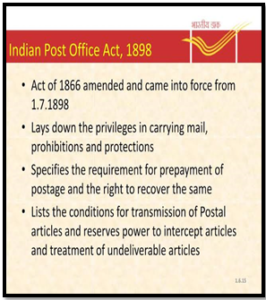THE POST OFFICE ACT
(UNCHECKED POWERS OF INTERCEPTION)
Syllabus :
- GS 2 : Government Policies and Interventions for Development in various sectors and Issues arising out of their Design and Implementation.
Why in the News?
- The President of India’s assent to the Post Office Bill, 2023, replacing the colonial-era Indian Post Office Act, 1898, has raised concerns about unchecked powers of interception.
- The lack of procedural safeguards and potential misuse are key points of contention.
Source : Slideserve
Replacing Colonial-Era Laws:
- The Telecommunications Bill, 2023, also received approval, replacing the Indian Telegraph Act, 1885, and the Indian Wireless Telegraphy Act, 1933.
- Section 20(2) of the new Telecommunication Act mirrors the interception provision in the Telegraph Act of 1885 but lacks defined procedural safeguards.
- Similar provision on interception in the Telecommunication Act (section 20(2)) as in the Telegraph Act (section 5(2)).
- Scope of interception wider under the Information Technology (IT) Act, 2000 (section 69(1)) without specified conditions.
Legal aspects :
- The Supreme Court’s intervention in People’s Union for Civil Liberties (PUCL) vs Union of India (1996) established procedural safeguards for telephonic interceptions.
- Court emphasized adherence to Article 19 (freedom of speech and expression) and Article 21 (right to life and personal liberty) of the Constitution.
- Draft report of the Sub-committee on fundamental rights included ‘the right of every citizen to the secrecy of his correspondence.’
Understanding Post Office Act
Features of the Act :
- Aim of the Act: The act consolidates and amends laws related to Indian post offices, expanding beyond traditional mail delivery services.
- Interception Authority: Section 9 grants the Centre authority for interception, opening, or detention of items in various situations, including state security, emergencies, and compliance with laws.
- Transfer to Customs: Post officers can transfer items to customs authorities when suspected of containing prohibited items or subject to duty.
- Liability Exemptions: Section 10 exempts the Post Office and officers from liability for loss, delay, or damage during services, except as prescribed.
- Offences and Penalties: Most offences from the 1898 Act are eliminated, with non-payment cases recoverable as arrears of land revenue.
- Exclusive Privileges Eliminated: Section 4 granting exclusive transport privileges for letters is removed.
- Regulation of Private Couriers: The 2023 Act now regulates private courier services, bringing them under its jurisdiction.
- Extended Powers of Director General: The Director General gains extended powers beyond postal operations, overseeing activities specified by the central government and establishing fees without parliamentary approval.
Concerns About Post Office Act:
- Confidential nature of items transported by the post office, invoking the right to privacy.
- Concerns during parliamentary debate:
- Unchecked powers of interception
- Undefined ’emergency’ conditions.
- Lack of procedural safeguards and
- Lack of Accountability for potential misuse.
- Legal Concerns :
- India’s commitment to the International Covenant on Civil and Political Rights, 1966, protecting privacy, family, home, and correspondence is challenged.
- Directive Principle 51(c) emphasizes respecting international conventions unless in conflict with domestic laws.
- Removal of conditions like ‘the occurrence of public emergency’ and ‘in the interest of public safety’ from the Post Office Act.
- Need for clarification on the vague term ’emergency’ by referring to established rules like 419A of the Telegraph Rules or the IT Rules.
- Concerns addressed through specific laws like the Indian Post Office Act, 1898, and the Indian Telegraph Act, 1885, permitting interception in specified circumstances.
- Lack of provisions for taking action against competent authorities for exceeding or misusing interception powers.
- Destruction of interception documents after a certain period creates accountability challenges.
- Review committees not bound to recommend disciplinary actions for misuse.
- The elimination of exclusive privileges may impact traditional postal services.
Way Forward :
- Constitutional Alignment: Ensure the Act aligns with constitutional provisions (Articles 14, 19(1)(a), and Article 21).
- Guidelines for Interception Powers: Introduce clear guidelines defining the scope and limits of state-granted interception powers.
- Definition of ‘Public Emergency’: Define ‘public emergency’ to prevent arbitrary use of interception powers.
- Transparent Interception Procedure: Outline a transparent procedure for interception in the Act.
- Independent Oversight Body: Establish an independent oversight body to review and authorize interception requests.
- Grievance Redressal Mechanism: Establish an accessible grievance redressal mechanism for citizens to raise concerns related to interception.
- Citizen Notification Requirement: Include a clause requiring the government to inform affected citizens about interception actions.
- Appeal Mechanism for Citizens: Provide a mechanism for citizens to appeal actions of interceptions.
- Adherence to Principles: Ensure adherence to principles of natural justice and due process in the appeal process.
- Specify Grounds for Interception: Address the concern of unbridled powers by specifying grounds for interception in the Act.
The enactment of the Post Office Act, 2023, without clear procedural safeguards and accountability measures for interception powers raises significant concerns. Balancing security needs with individual privacy becomes paramount, necessitating immediate attention and potential amendments to address these apprehensions. The government must ensure that citizens’ rights are protected, and the legal framework aligns with constitutional principles and international commitments.
Source:
Mains Practice Question :
Examine the key provisions of the Post Office Act, 2023, related to interception powers. Evaluate the implications on privacy, constitutional rights, and the need for procedural safeguards.

 Source : Slideserve
Source : Slideserve 

